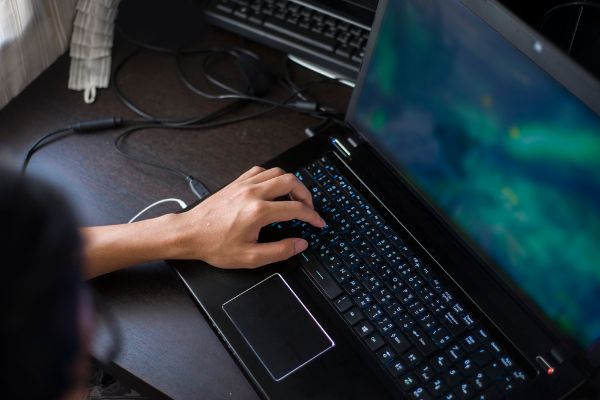Disclaimer: This post may contain affiliate links, meaning we get a small commission if you make a purchase through our links, at no cost to you. For more information, please visit our Disclaimer Page.
When many people think of a typical gamer, they might get images of someone running a high-end desktop rig with many bells, whistles, and peripherals to enhance the whole experience. While it is true that desktop computers tend to be the go-to choice for gaming, there are specific subsets of laptop computers that are intended for the same purpose.
Laptops for gaming might be a bit less customizable than their stationary counterparts, but they are more portable, and they allow many gamers to take their entertainment with them to have fun when they are out and about. Further, they can plan cooperative gaming sessions in which they meet up with friends, which can provide a welcome change from just online gaming.
Even though many modern laptops can run games without issues, some players can see that their own models don’t seem to be running quite as smoothly as they thought. There are various reasons why specific laptops don’t seem to run games well, and we will go through some of the most common ones here.
Similarly, we’ll check out how different users might make their own laptops more compatible with particular games they would like to play, what sorts of titles you might play on a budget laptop that is not meant for gaming, and why gameplay might lag over a network even when the internet connection is solid.
Table of Contents
Why Can’t My Laptop Run Games Smoothly?
Most laptops should be able to run some games without issues. However, many models can’t run high-end games without having some problems with the smoothness of the gameplay. Although gaming-centric laptops should deal with this better, even their specs can hamper the types of games you might be able to play.
Additionally, how well a game plays on your laptop can have much to do with the specific settings that you choose for the title. Many games offer various video and audio options that are designed to enhance the experience and make it more immersive. This is great if your machine can handle it, but it can make for a jarring experience if the laptop has trouble rendering things.
The main reasons why your laptop might not be running games in the smoothest ways possible have to do with the specifications of your laptop or the types of games you are trying to play.
Sometimes, these things can intertwine with each other, too. The first thing to do is check the minimum requirements of the games you would like to play.
Your laptop must meet at least these specifications in order to run the games at all. You could get lucky and be able to play a title that runs on your laptop even when the machine doesn’t match these specs.
However, this will almost certainly result in very choppy gameplay, and that will make for an experience that just isn’t enjoyable for most players.
Additionally, there are also recommended requirements for most games. These are the specifications that the game developer thinks are the minimum that machines would need in order to make the experience as immersive as possible.
You should not be getting many issues with gameplay if your computer can run on at least these settings. If your laptop cannot meet this bar, you may experience issues with choppiness, lagging, problems rendering, and general things that take you out of the game.
It is even possible that freezing or the game going to the desktop could occur, making it harder to play the title at all.
How Can I Make My Laptop Compatible With Games?
This section assumes that you might have a laptop that is not necessarily optimized for gaming. However, the machine should still be able to play some games. In other cases, you may want to make changes to the device’s hardware in order for it to run the games of your choice later.
Before we recommend specific things to do to the laptop or things to upgrade, it might be worth trying to change some of the settings of the game itself. If you’re familiar with all of the video options in the game, you can turn these down to the lowest setting to which they will possibly go.
This will have some negative impact on how the game looks, but it may improve how it runs on your system. Some titles even have automatic categories from which you can choose in order to run them on low, medium, or high settings, and each of these will try to optimize the game by using different levels of your laptop’s resources.
That said, many gamers run into issues with playing titles at all, and it is possible that the laptop just isn’t compatible with many of the ones you might like to enjoy. If this is the case, there are a few things you can do that might improve the device’s performance in this area:
1. Typically, it is much harder to upgrade laptops than their desktop cousins. However, there are three main things you can upgrade, and each of them can have a massive impact on the performance of your machine. These upgrades include RAM, general storage, and the battery.
2. You should see a big boost in performance if you upgrade the RAM, and switching to faster storage can help with load times and rendering, too.
3. Although not an upgrade per se, switching the kind of mouse and keyboard that you use can offer a smoother gaming experience.
4. Keep the drivers as current as possible. What your laptop can do is directly tied to the kinds of drivers it has at its disposal. A driver is a set of files that acts as instructions for how the computer can do the things you want it to do. Later driver versions typically offer more options.
5. For Windows laptops, DirectX is meant to help with gaming, particularly with the graphics side of things. Make sure your laptop can run the latest version of this for the best results.
6. Although this is not recommended for novices in computer hardware, you can try to overclock the graphics processing unit in order to squeeze more performance out of it.
7. You can increase the power settings to support a high level of performance.
8. If it is available, you can activate gaming mode to run titles at the highest settings your device can support.
9. Close unrelated background processes to free up system memory for gaming.
Can You Run Games on a Normal or Cheap Laptop?
Yes and no. The answer to this question depends on the kinds of games you are running. The latest, most resource-intensive games probably won’t run well on a budget laptop that is not optimized for gaming. In some cases, they may not be able to start at all.
You may be able to run some of the latest titles on very low settings, but it is not likely. Having said that, many regular laptops made within the last few years can run some games that were developed and produced around the same time. Some games, especially those made by small studios without many resources, are not intensive on the resources of your system.
A regular laptop can still run many titles like these, even on recommended settings. If you are ever unsure about things and want to check before you buy, there are websites like this one that will tell you what the minimum and recommended requirements are for many popular titles that may interest you.
Why Is My Game Lagging but My Internet Is Fine?
Online games are popular with many players, and you would need both a fast internet connection and a good laptop in order to enjoy these kinds of titles to their full potential.
There are cases in which you might still experience lag with such games, and this can be true even when you know your internet connection seems to be operating at good speeds. This lag problem could have several causes, but there are a few general things you can try to see if you can fix the issue.
Firstly, it is important to try to eliminate some of the possibilities. You can do this by doing a clean boot of your laptop. Doing this will start it up with minimal drivers and utilities, and it may allow you to isolate the problem you are facing.
If you can’t seem to pinpoint the solution in this way, it may be a different issue altogether. You can try running a diagnostic on the RAM itself to see if there are any problems with the system’s memory.
Lastly, you can turn down the overall appearance settings of the laptop but set its performance to the maximum values to see if this helps with lag.
Conclusion
Laptops are great for light tasks when you need to be on the go, but that doesn’t mean you can’t have some more concentrated fun with them. Even a regular laptop can run some older or less intense games on its system well, and many computers in this form factor are made for gaming.
If you’re experiencing any issues while playing games, you may need to change the settings of your device or upgrade it, and you can use some of our troubleshooting tips here to assist you.


